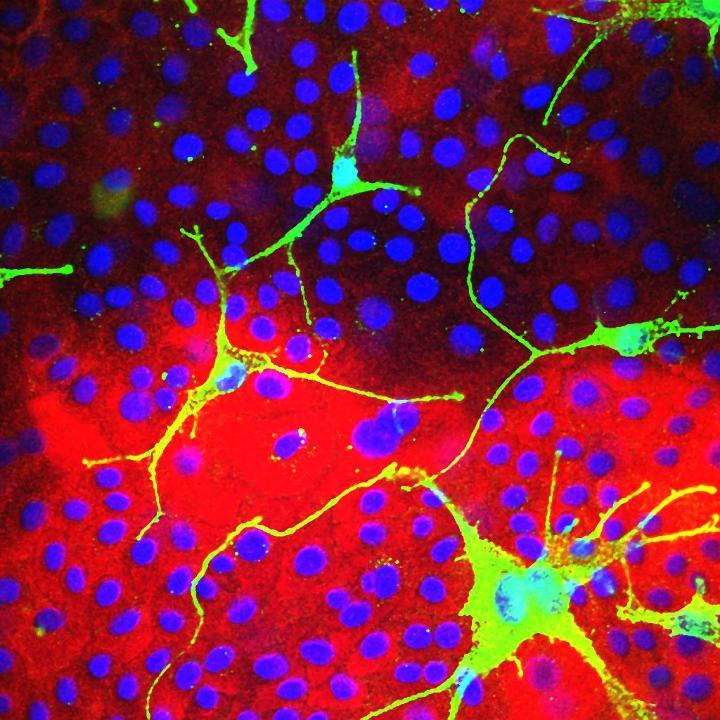MSc Skin Sciences and Stem Cell Biology
What is Skin Science and Stem Cell Biology?
Regenerative medicine is the field of medical biosciences and medicine that develops technologies to restore, repair or replace cells, organs or tissues damaged due to acute trauma, disease or ageing. The principles of regenerative medicine based on transplantation of adult stem cells are well-established to treat disease, with hematopoietic stem cell (bone marrow) transplantation in clinical use for over 50 years. Nevertheless, the rapid advances in molecular, cell and developmental biology over the last two decades has led to recent rapid progress in regenerative medicine, including generation of induced pluripotent stem cells, direct adult stem cell trans-differentiation, gene editing, in situ cell, tissue and organ regeneration, 3D-cultured organoid and interspecies chimeric organ production etc. These developments, though often in their early stages, promise significant improvements in medicine and healthcare in the near future.
Skin is the largest organ of the human body and it possesses an unique regenerative capacity due to the abundant active stem cells located in the epidermis, hair follicle, dermis and sub-cutis. Skin sciences are focused on the studies of skin and hair follicle structure, functions and regeneration in health and disease as well as developing the technologies to improve skin and hair health. Skin sciences are closely connected to regenerative medicine in so far as they share many common principles and goals.
Skin sciences and stem cell biology are not only important in the treatment of human diseases and disorders, but also in improving ones personal appearance and well-being. The personal care and cosmetics industry is based on the skin sciences and generates over 500 billion USD in revenue annually. Importantly, consumers and regulatory agencies increasingly expect new personal care and cosmetic products to be developed using solid, evidence-based science.
Our MSc programme provides students with a unique blend of advanced knowledge, understanding and practical research skills in skin sciences and regenerative medicine based on modern principles of molecular, cell and development biology. It also provides the knowledge and skills required to develop and launch new products in the life science industries.
As an MSc in Skin Sciences and Stem Cell Biology graduate you can make an impact in many areas including:
- the regenerative medicine industry and clinical practice
- the biotechnology and pharmaceutical industry
- the personal care and cosmetics industry
- sales and marketing in the life science industries
- bioscience and biomedical research
Skin Sciences and Regenerative Medicine in the School of Chemistry and Biosciences
The School of Chemistry and Biosciences (CBS) is committed to carrying out high impact research in skin sciences and regenerative medicine which is concentrated in the Centre for Skin Sciences (CSS). The CSS one of the leading centres for skin research in Europe and the best centre for basic and applied molecular and cellular bioscience research at the University of Bradford.
CSS researchers have established productive collaborations with leading academic institutions and industrial partners across the globe. CSS research is funded by a diverse portfolio of grants from the UK and international governments as well as from charitable and industrial bodies.

Melanocytes (green) extend their dendrites in and around keratinocytes (red). This is a model system for the study of melanogenesis and melanin transfer in skin.
What do graduates of Skin Science and Stem Cell Biology do next?
Students who graduate from our master in Skin Science and Stem Cell Biology programme are equipped with the skills and knowledge to enter into a research career in academia or industry. Typically our graduates have moved into a variety of jobs ranging from further studies to gain a PhD through to some who have established their own skin care businesses!
The types of industry with recruiters who are looking for skin science master graduates include:
- Fast Moving Consumer Goods (FMCG) companies developing cosmetics and personal care products
- Stem cell therapeutics
- Pharmaceutical drug development for skin diseases
- Biotechnology
- Intellectual property offices in the life science industry
- Technical sales and marketing
- Scientific recruitment
